|
Politburo Member General Secretary Nguyen Phu Trong |
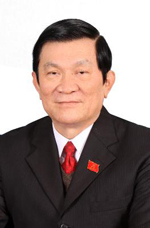
Politburo Member
Truong Tan Sang
| Politburo Member
Phung Quang Thanh
|

Politburo Member
Nguyen Tan Dung
|
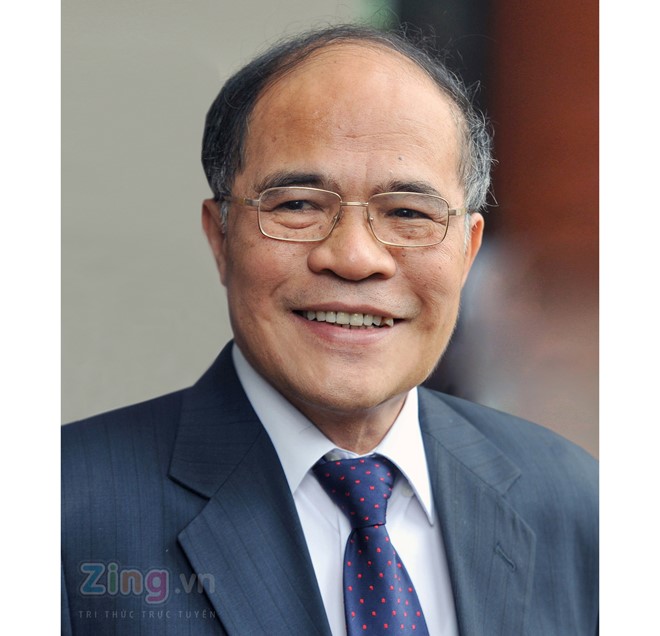
Politburo Member
Nguyen Sinh Hung | 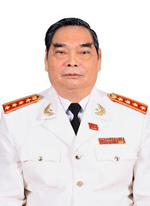
Politburo Member
Le Hong Anh
|
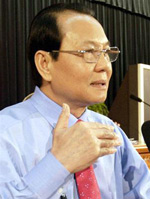
Politburo Member
Le Thanh Hai | 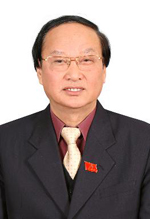
Politburo Member
To Huy Rua |
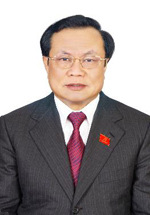 Politburo Member Politburo Member
Pham Quang Nghi
| 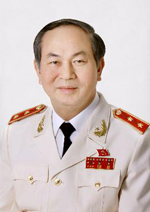
Politburo Member
Tran Dai Quang
| 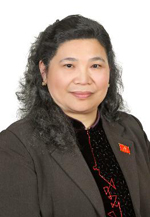
Politburo Member
Tong Thi Phong
| 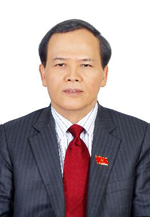
Politburo Member
Ngo Van Du |
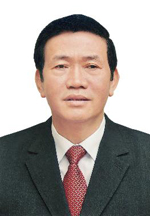 Politburo Member Politburo Member
Đinh The Huynh
| 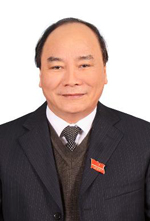
Politburo Member
Nguyen Xuan Phuc | |
|
POLITBURO MEMBERS OF THE CENTRAL COMMITTEE OF THE COMMUNIST PARTY OF VIET NAM
(10th TENURE)
|
Politburo Member General Secretary Nong Duc Manh
|
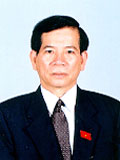
Politburo Member
President
Nguyen Minh Triet
| Politburo Member
Prime Minister
Nguyen Tan Dung | 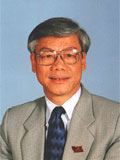
Politburo Member
National Assembly's Chairman
Nguyen Phu Trong
|
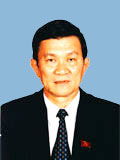
Politburo Member
Standing Member of the Central Secretariat
Truong Tan Sang |
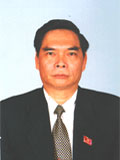
Politburo Member
Le Hong Anh
|
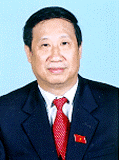
Politburo Member
Pham Gia Khiem |
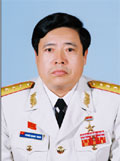
Politburo Member
Phung Quang Thanh |
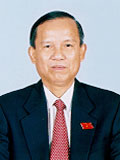 Politburo Member
Politburo Member
Truong Vinh Trong
| 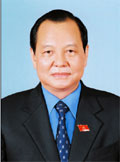
Politburo Member
Le Thanh Hai
| 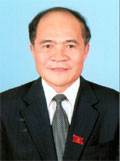
Politburo Member
Nguyen Sinh Hung
| 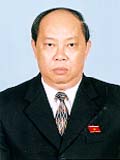
Politburo Member
Nguyen Van Chi Chi |
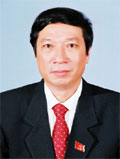 Politburo Member
Politburo Member
Ho Duc Viet
| 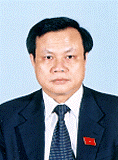
Politburo Member
Pham Quang Nghi | |
POLITBURO MEMBERS OF THE CENTRAL COMMITTEE OF THE COMMUNIST PARTY OF VIET NAM
(9th TENURE)
Politburo Member General Secretary Nong Duc Manh
|

Politburo Member
President
Tran Duc Luong
| Politburo Member
Prime Minister
Phan Van Khai | 
Politburo Member
National Assembly's Chairman
Nguyen Van An
|

Politburo Member
Standing Member of the Central Secretariat
Phan Dien |
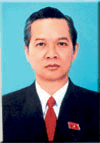
Politburo Member
Nguyen Tan Dung
|

Politburo Member
Pham Van Tra |

Politburo Member
Le Minh Huong |
 Politburo Member
Politburo Member
Le Hong Anh | 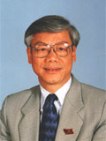
Politburo Member
Nguyen Phu Trong
| 
Politburo Member
Nguyen Minh Triet
| 
Politburo Member
Truong Tan Sang |
 Politburo Member
Politburo Member
Nguyen Khoa Diem
| 
Politburo Member
Tran Dinh Hoan |  Politburo Member
Politburo Member
Truong Quang Duoc |
II. State system1. The National AssemblyThe National Assembly is the highest representative organ of the people; the highest organ of state power of the Socialist Republic of Viet Nam, the sole organ that has the constitutional and legislative rights.
a) Functions:The National Assembly decides the fundamental domestic and foreign policies, the socio-economic tasks, national defense and security issues, the major principles governing the State machinery, the social relations and activities of citizens. The National Assembly exercises the right to supreme supervision of all activities of the State.
The National Assembly has the highest authority to make Constitution and Laws. Legal documents promulgated by the National Assembly are the Constitution, codes, laws and resolutions.
The National Assembly has three main functions: legislative, deciding the important issues of the country and carrying out the supreme supervision power of all activities of the State.
The Legislative Function
The National Assembly is the sole body empowered to adopt the Constitution and the laws. The National Assembly not only adopts and amends the Constitution and the law, but also decides on the legislative program.
According to the 1992 Constitution, the President of the Republic, the Standing Committee of the National Assembly, the Ethnic Council, the Committees of the National Assembly, the Government, the Supreme People's Court, the Supreme People's Procuracy, the Viet Nam Fatherland Front and its members, as well as the individual Deputies to the National Assembly have right to present bills to the National Assembly.
Before being presented to the National Assembly, bills are first examined and commented on by the Ethnic Council or the relevant Committee of the National Assembly. The bills are then sent to all Deputies to the National Assembly not later than 20 days before the opening date of the National Assembly session.
The bills which require public discussion are published and aired by the mass-media, so that the people and the state organs at all levels are able to have comment before presentation of those bills to the National Assembly.
All bills are discussed at the National Assembly session, first by groups of members, and then by all the members at a plenary session.
A bill becomes duly-adopted law when a single majority of the Deputies to the National Assembly vote in favor of its adoption.
After being adopted by the National Assembly, the bill must be signed by the President of the National Assembly. The President of the Republic promulgates the law, which becomes effective no later than 15 days from the date of its adoption.
The function of deciding the important issues of the Nation
As the highest state authority, the National Assembly make decision on the socio-economic development plans of the country; on the national financial and monetary policies and on the estimates of the national revenue and expenditure plans. It also decides the State budget, approves the national revenue and expenditure balance of account, and levies, amends and abolishes taxes.
The National Assembly elects the President of the Republic, the Chairman of the National Assembly and the Prime Minister. It approves all appointments of Ministers upon the recommendation of the Government.
The National Assembly has the authority to establish and dissolve ministries and ministerial level agencies of the Government, as well as to establish, merge, divide and adjust the boundaries of the provinces and cities directly under the central authority. It can also establish or dissolve special administrative economic establishments.
The National Assembly decides issues of war and peace. It also has the power to declare an emergency situation and may take other special measures to ensure national defense and security.
The National Assembly decides on amnesties and referenda.
With respect to foreign affairs, the National Assembly decides on fundamental external policies. At the request of the President of the Republic, it ratifies or revokes those international treaties that Viet Nam has signed or adhered to.
The supervision function
The National Assembly exercises the supreme power of supervision over all activities of the State. This function is carried out through the activities of the National Assembly, the Standing Committee of the National Assembly, the Ethnic Council, the Committees of the National Assembly and individual deputies to the National Assembly.
The National Assembly examines all working reports of the President of the Republic, the Standing Committee of the National Assembly, the Government, the Supreme People's Court and of the Supreme People's Procuracy.
The National Assembly considers Activity Reports of the President of the Republic, the Standing Committee of the National Assembly, the Government, the Supreme People's Court and the Supreme People's Procuracy. It is entitled to abolish any legal documents issued by the President of the Republic, the Standing Committee of the National Assembly, the Government, the Prime Minister, the Supreme People's Court and the Supreme People's Procuracy, that is not conformed to the Constitution, the Laws and Resolutions of the National Assembly.
The Standing Committee of the National Assembly supervises the implementation of the Constitution, the Laws, and the Resolutions of the National Assembly, as well as the Ordinances, and Resolutions of the Standing Committee of the National Assembly. It also supervises the activities of the Government, the Supreme People's Court, the Supreme People's Procuracy. It may suspend the effect of any legal document of the Government, the Supreme People's Court, and the Supreme People's Procuracy, which is not in conformity with the Constitution, the Laws or the Resolutions of the National Assembly, and may request the National Assembly to consider abolishing any such documents, and to abolish any such documents of the Government, the Prime Minister of the Government, the Supreme People's Court, and the Supreme People's Procuracy, which are not conformity with the Ordinances and the Resolutions National Assembly of the Standing Committee of the National Assembly.
The Ethnic Council and the Committees of the National Assembly supervise the implementation of the Constitution, the Laws and the Resolutions of the National Assembly within their respective fields of responsibility. They may require the agencies, organizations and individuals under their supervision to provide documents and reports on the subjects under consideration. .
If any violation of the law is discovered, the Ethnic Council and the Committees of the National Assembly are entitled to require the violating organization or individual to cease such violation. They may also recommend measures against the authorities or/and and may also report the matter to the Standing Committee.
The results of the supervision, together with the recommendations of the Ethnic Council or the Committees, are reported to the Standing Committee of the National Assembly and the relevant agencies are notified.
The Deputies to the National Assembly may question the President of the Republic, the President of the National Assembly, the Prime Minister, Ministers and other members of the Government, the President of the Supreme People's Court and the Procurator General. The person who is questioned must answer in person to the National Assembly at its session. In case investigation is required, the National Assembly may decide to convey the question either to Standing Committee or to the next session, or by written response. The deputies to the National Assembly may also require the state agencies, social organizations, economic organizations, and the armed force units to answer any questions put to them. The Head of such agencies, organizations and units are obliged to answer within the period of time as provided by the law.
b) The terms of the National Assembly: The term of each National Assembly is five years.
c) Deputies to the National Assembly:Any Deputy to the National Assembly must be a person, who is at the youngest of 21 and faithful to the Fatherland and the Constitution of the Socialist Republic of Viet Nam, striving to implement the renovation for the course of wealthy people and strong country; having a sufficient level of qualification, and being capable of performing the duties of a Deputy to the National Assembly, deciding important issues of the Nation, having good conduct, moral and ethics, and who is otherwise exemplary in respecting the law and worthy of the people's trust.
Deputies to the National Assembly are elected directly by the people and act on behalf of the people in the National Assembly.
A Deputy to the National Assembly takes part in deciding issues within the competence of the National Assembly such as adopting the Constitution and all laws, deciding domestic and external policies, including those affecting economic and social affairs. Other issues within the competence of the National Assembly that a Deputy takes part in deciding include national defense and security, fundamental principles of organization and activities of the State apparatus, social relationships and activities of citizens, and the supervision of activities of state agencies.
d) The Chairman and Vice Chairmen of the National Assembly: They are elected by the National Assembly among NA deputies in the first session of every NA tenure. Vice Chairmen are the assistants to the Chairman as assigned by the latter.
e) The Standing Committee of the National Assembly:The Standing Committee of the National Assembly is the permanent body of the National Assembly between the two sessions.
The Standing Committee supervises the implementation of the Constitution, laws and resolutions approved by the National Assembly, ordinances and resolutions issued by the NA Standing Committee; and the performance of the Government, Supreme People’s Court, Supreme People’s Procuracy.
The NA Standing Committee shall issue ordinances to clarify the Constitution, laws and ordinance.
The members of the Standing Committee of the National Assembly may not simultaneously be members of the Government. The majority of the members work on full-time basis. The terms of office correspond with the term of office of the National Assembly. When the term of the National Assembly, the Standing Committee of the National Assembly continues to work until the new National Assembly elects a new Standing Committee.
The 1992 Constitution stipulates that the Standing Committee of the National Assembly has twelve tasks and powers. Among them are the powers to announce, convene and chair the National Assembly sessions, to interpret the constitution, laws and ordinances, and to issue ordinances on those matters assigned by the National Assembly. The Standing Committee of the National Assembly also supervises and guides the activities of the People's Councils and directs, regulates and coordinates the activities of the Council of Ethnic Affairs and all Committees of the National Assembly.
g) Councils administered by the National Assembly: The National Defense and Security Council consists of the State President as the Chairman, the Prime Minister as the Vice Chairman and four members.
The Council of Ethnic Affairs consists of one Chairman and 38 members.
h) Functional committees of the National Assembly: Committee on Laws, Committee on Justice, Committee on External Relations, Committee on Economy and Budget, Committee on National Defense and Security, Committee on Social Issues, Committee on Education, Culture, Youth and Children, and Committee on Science, Technology and Environment
2. The State President:The State President, as the Head of State, is elected by the National Assembly from among its deputies to represent the Socialist Republic of Viet Nam internally and externally.
According to Article 103 of the 1992 Constitution, the President has major executive and legislative power as follows:
- Promulgates legal documents adopted by the National Assembly, such as the Constitution, laws and ordinances;
- Has overall command of the armed forces and holds the office of Chairman of the National Defense and Security Council;
- Appoints or proposes the appointment of, releases from duty, dismisses the Vice-Presidents, Prime Minister, Chief Judge of the Supreme People's Court, Head of the Supreme People's Procuracy;
The President is assisted by the Vice President, the President’s Office, and the National Defense and Security Council.
+ Vice President is proposed by the President and elected by the National Assembly from among NA deputies; The Vice President assists the President and may be authorized by the President to do some tasks or functions as the acting President.
+ The National Defense and Security Council can mobilize the country’s forces and potentialities to protect the fatherland. It is chaired by the President; its members are introduced by the President and voted by the National Assembly.
3. The Government:The Government is the executive organ of the National Assembly, and the supreme state administrative agency of the Socialist Republic of Viet Nam.
The Government is in charge of tasks assigned by the State in the fields of politics, socio-economy, national defense, security and external relations; maintains effective operation of the State apparatus from the central to grassroots levels; ensures the respect for, and implementation of the Constitution and laws; promotes the people’s sense of mastery in national defense and construction; ensures stability and improves the people’s material and spiritual life.
The Government is accountable to the National Assembly, the National Assembly’s Standing Committee and the President of State.
Components of the Government are: Prime Minister, Deputy Prime Ministers, and Ministers and Heads of ministerial-level agencies.
The Prime Minister is elected, released from office or dismissed by the National Assembly at the State President’s request.
The Deputy Prime Ministers are approved by the National Assembly at the Prime Minister’s request. They function as the assistants to the Prime Minister and may be authorized by the Prime Minister in the case of the latter’s absence.
Ministers and heads of the ministerial-level agencies are approved by the National Assembly at the Prime Minister’s proposal. They are in charge of State management over their assigned branches or affairs.
4. Supreme People’s Court:The Supreme People’s Court is the highest judicial organ of the Socialist Republic of Viet Nam.
The Supreme People’s Court consists of the Chief Judge, Deputy Chief Judge, jurors and court secretaries.
The structure: Council of Judges, Commission of Judges, Central Military Court, Criminal Court, Civil Court, Appeal Court, and assisting staff.
The National Assembly elects and dismisses the Chief Judge of the Supreme People’s Court. The State President nominates/dismisses Deputy Chief Judge and judges at the Chief Judge’s request. The People’s Jurors are introduced by the Central Committee of the Viet Nam Fatherland Front and appointed by the National Assembly Standing Committee.
Main operating principles of courts: during the hearings, the judges and jurors are independent and only obey the laws. Justice and democracy are ensured by the open hearing process, in which jurors play an essential role, defendants have the right to defend themselves, or to hire lawyers. They also have the right to use their native languages in courts.
5. Supreme People’s Procuracy:The Supreme People’s Procuracy observes the implementation of and respect for the Constitution and laws by Ministries, ministerial-level agencies, Governmental organs, local authorities, social and economic organizations, armed forces, security forces and all citizens; and to practice public prosecution as stipulated by laws, ensuring due law enforcement.
The Supreme People’s Procuracy consists of the Head who can be elected, dismissed, or removed from office by the National Assembly on the State President’s proposal, the Deputy Heads, prosecutors and inspector appointed or dismissed by the State President at the Head’s request.
6. Local authorities:a) People’s Councils: - People’s Councils of the centrally-administered cities and provinces
- People’s Councils of districts
- People’s Councils of the provincial-level cities/towns
- People’s Councils of communes, wards and towns.
b) People’s Committee: - Provincial level: consisting of services, subcommittees, other organs administered by the People’s Committees and the People’s Committee offices
- District level: consisting of departments, sections, other organs administered by the People’s Committees and the People’s Committee offices
- Communal level: sections and the offices.
c) Local people’s committees: - Provincial-level people’s courts
- District-level people’s courts.
d) Local people’s procuracy: Provincial and district levels.III. The Việt Nam Fatherland FrontThe Viet Nam Fatherland Front (VFF) is a voluntary political coalition of political organizations, socio-political organizations, social organizations and individuals from all classes, social strata, ethnic groups, and religions, including overseas Vietnamese.
The VFF’s objectives are to gather and build up a whole-people unity bloc, strengthen the people’s political and spiritual consensus, encourage the people to promote their mastership, to implement the CPV’s guidelines and policies, and to abide by the Constitution and laws.
The VFF is governed by the principles of democratic consensus, coordinated and united action.
The VFF has its own statute.
The system of the VFF’s organs is in accordance with that of the State’s administrative structure from the central to grass-root levels.
IV. Viet Nam Labor ConfederationThe Viet Nam Labor Confederation is the socio-political organization of the working class and is a member of the VFF.
Article 2 of the Law on Labor Union stipulates that: “the labor unions “represent and protect laborers’ legitimate interests and rights, cooperate with the State in developing production, generating more jobs and improving laborers’ spiritual and material life.”
According to Article 5 Section II of the Law, the labor unions “cooperate with State organs in building laws and policies on labour, salary, labour safety and other social policies concerning the rights, duties and interests of workers.”
The Viet Nam Labor Confederation is well-organised, has various levels and operates all over the country. The organisation is governed by the principle of democratic centralism. All its directing organs are formed through elections. The highest directing organ of each level is the Union Congress of that level. In the period between the two Congress sessions, the directing organ is the Standing Committee which is set up by the Congress.
The Viet Nam Labor Confederation is structured in accordance with occupations and geographical areas.
V. Other social and political organizationsApart from the Viet Nam Fatherland Front and the Việt nam Labor Confederation, in Viet Nam, there are other political and social organizations, such as the Viet Nam Women’s Association, the Hồ Chí Minh Communist Youth’s Union, the Viet Nam Veterans’ Association, and professional associations. These organizations played an important role in the struggle for national salvation. In the cause of renovation, industrialization and modernization, they have continued to contribute to the implementation of the Party’s guidelines and the Government’s policies.